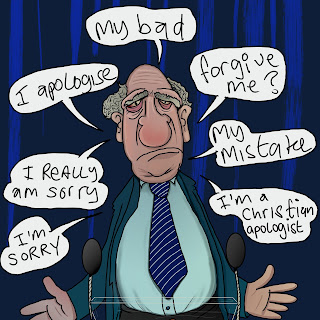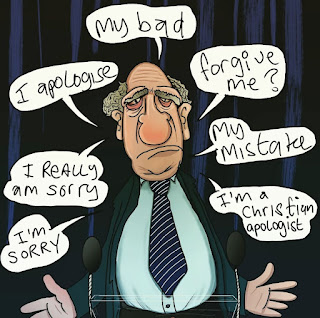Was William Lane Craig Right?
The Apologist.
It is important to appreciate how the power of interpretation, existential meaning and subjective experience all influence religiosity. They play a significant role with maintaining faith, even to the point that the most potent of all the evidence-based arguments will often fail to persuade a believer to abandon their worldview. The religious mandate of an apologist might necessitate him/her to rationalise backwards; initiating a conclusion and implementing theology that fits it. One great defence of theism is to be found in the Christian Apologist William Lane Craig.
William Lane Craig is a self confessed 'Christian Philosopher' though, how this differs to a philosopher who happens to be a Christian is unclear. The Christian told a YouTuber, Alex, the Cosmicskeptic, that in his 'own theology,' it was a 'tremendous blessing' that ancient Canaanite children were slaughtered by 'God's people', because, he declared, those kids went to heaven! God can kill and save who he likes, he added.
Tension once existed between William Lane Craig and Richard Dawkins too, a British evolutionary biologist who still avoids publicly debating the man. In fact, Craig's reputation among Christians has prospered due to Dawkins lack of participation. However, Craig does have his critics, especially for smearing Sam Harris during a live debate.
Craig has been observed evading important questions and issues raised by his opponents. He has also been accused of misrepresenting scientific work from Stephen Hawking and Michael Ruse, for instance (Pearce, 2014). This apologist will use equivocation fallacies and reduce complex arguments to oversimplified caricatures without even thinking about it; the simple arguments are easiest to destroy. For example, in one debate, Craig misrepresented philosopher Daniel Dennett's position on consciousness by saying that Dennett believes people don't even have self-awareness.
Fair enough, an apologist can be skilled at convincing some audiences, overall, but such tactics essentially detract from the quality of respected highbrow discourse. This is where they clash with the analytical atheist.
Three of Craig's key supporting premises in his structured case for Jesus Christ's resurrection, is the historicity of Jesus Christ's empty tomb:
1. Joseph of Arimathea entombed Jesus.
2. Women from Jesus's circle discovered the tomb empty on the Sunday after the crucifixion.
3. The best explanation for the empty tomb is that Jesus was resurrected from the dead.
It's easy to debunk his arguments, for example:
1. The actual historicity of the empty tomb itself is not certain. Yes, all the gospels mention an empty tomb, but, to be fair, nothing independent of historical significance proves the tomb actually existed. We also have no guarantees of its empty discovery three days after post crucifixion. The jury is still out, there are still debates exploring the topic, which shows that Craig's claim is not a given fact, but presupposition.
2. Even if we do pretend that the biblical tomb is historical and empty, alternative explanations significantly more plausible than the resurrection of a corpse are readily available. For example, the body might have been moved by an unknown party, or perhaps, the female followers visited someone else's tomb by mistake. A list could be compiled. Craig's hopes the empty tomb is bound to the resurrection of Jesus before he walked away. Wishful thinking.
3. Again, Craig takes the gospels for granted as sound forms of evidence. Tainted by religio-political bias and pieced together years after the events they describe, they contain numerous discrepancies and editorial interjection. They may be historical, but they are not reliable historical records.
Overall, Craig's arguments are easily disputed because they are weak. Check out his cosmological argument:
Craig has featured this Kalam cosmological argument in various debates shown on YouTube. This theistic philosophical assault for the existence of God, makes the same mistake. It bases itself on the assumption that 'the universe had a beginning, and therefore, it must have had a cause (which is God)'. The argument goes like this:
1. Everything that begins to exist has a cause.
2. The universe began to exist.
3. Therefore, the universe has a cause.
Again, Craig deals his presupposition, assuming God is the prime causality. The apologist assumes the workings of time. Checkout the following counter arguments:
1. The first premise is not necessarily true. Our intuition and everyday experiences may inform our beliefs of causality within this part of the universe in which we live, but, in all its majesty, we cannot speak for the entirety. We don't know if causality applies to the absolute sum of the universe or to something beyond our observational limit. Science has gaps of knowledge about the big bang.
2. The cosmic microwave background radiation evidences the universes expansion; these observations do not imply our universe was caused to come into existence. It is not impossible that the universe is a self-contained system and free from causation. Therefore, that claim is redundant.
3. Craig assumes that time is linear, and absolute, again, this may not be the case. We know certain theories of quantum mechanics and general relativity state that time is not as straightforward as we normally think; it undermines the reliance on Craig's notion of a 'first cause', these arguments greatly appeal to our common intuitions about the world.
Verdict
The cosmological argument provided by Craig is quite controversial and somewhat deceptive. Neither this or the tomb argument lightens theism's burden of proof. The empty tomb may be the weakest of the two. We do not require undeniable proof of Christ's missing tomb, or the conditions of the universes beginning; persistence only risks non-falsifiable fallacy.
However, it is interesting, why key evangelicals would perform public debates that will never be resolved.
The obvious plus point for theists is the indirect proselytising and preaching. Ironically, Craig calls his website Reasonable Faith; he has a book by the same name, yet he has admitted it is improper to apply reason to faith.
He has said on television that he does not base his belief on arguments and evidence; we know they are paths to his predictable conclusions (God). Following his 'ministerial use of reason' (the gospels before thinking), Craig has admitted to serving faith like a hand maiden. This is not reasonable but just faith.
If the main purpose of debating events were merely to attract numbers for church seats, that would be unfortunate, given the decline in Christianity.
_____________________________________
Reference
Pearce, J (2014) William Lane Craig Misrepresents and Strawmans Ca On His Podcast, Denying Science. [Online] Available from: www.skepticink.com. Retrieved from:https://skepticink.com/tippling/2014/04/10/william-lane-craig-misrepresents-and-strawmans-ca-on-his-podcast-denying-science/
.jpg) |
| I used to think they apologised a lot! |




Comments
Post a Comment
What are your thoughts?